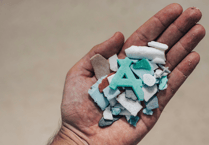WHAT do Halle Berry, Aretha Franklin and Sir Steve Redgrave have in common? Apart from being famous?
They all suffer from type 1 diabetes — a condition which can strike young or old, male or female, with no warning and to devastating effect.
Diabetes is a condition where the amount of glucose in the blood is too high, because the body cannot use it properly. Insulin, produced by the pancreas, allows glucose to enter the body's cells, where it is used as fuel for energy.
Type 2 diabetes develops when the body can make some insulin, but not enough, or when the insulin produced does not work properly. It can be treated by diet alone and increased physical activity.
But Type 1 diabetes is very different. This is when the body stops producing insulin altogether. The typical symptom is incredible thirst, extreme tiredness and the patient quickly begins to feel very unwell.
It's a hard enough diagnosis to take as an adult — as a child, the implications can seem huge, and this is where Mary Jefferies, a paediatric diabetes specialist nurse with West Devon's children's community nursing team, takes over.
Mary said: 'A child once diagnosed would go into hospital for up to three days, but once they go home, that's when we come in.
'They will have intensive support and and we will see them regularly at home.
'Diabetes in children is a massive diagnosis, and it has a massive impact on the whole family.'
Sufferers of type 1 diabetes will need to self inject between four and six times a day, and also monitor their blood sugars at the same time. It takes a lot of getting used to.
Mary said: 'You get very close to the children — you are their rock while they are getting to grips with it and you have to be there for whatever advice they need.
'And it's a constantly changing thing, as parents have to learn how to monitor and do the insulin.'
The area covered by Mary and the other two nurses in the team is huge, covering Plymouth, South East Cornwall and West Devon, all the way as far as Bude. There are currently around 220 children and young people registered in their care — Mary has between 70 and 100 patients on her books.
The majority of them are over the age of five, but recently there has been a big increase in the number of new diagnoses in children younger than this.
Mary said: 'Sometimes families will have some knowledge of diabetes and will almost suspect what the diagnosis is going to be. To others, it's a complete shock, but for all of them, there's a massive period of re-adjustment.
'It's a life-changing diagnosis for the whole family and these youngsters need a huge amount of support to come to terms with it.
'If you think about the daily grind of doing all these blood tests, taking insulin, balancing diet and exercise, not being able to let your hair down without having consequences, day in, day out, it's a really big thing.
'It you think how hard it is to give something up for Lent, or stick to a diet, and how easy it is to fall off the perch, we are asking these youngsters to stick to this discipline every single day, for the rest of their lives.'
Mary said the most important thing for diabetics to learn was that balance was the absolute key to managing their condition, and keeping good control over it.
'We have very high expectations here of how our children will do, because we know that high expectations leads to long and healthy lives. We do demand a high level of commitment to achieve good control.'
She said there was 'a lot of rubbish' talked about diabetic diet, but basically it was about eating healthy, regular meals and keeping sweet treats as just that — the occasional indulgence.
The impact of dietary control is another change where the whole family can be affected — and often, for the better.
And what about the bit that most people find challenging — needles?
Mary said: 'There's an awful lot of anxiety to start with, because their first memory of needles is often a vaccination or having blood taken and they can be unpleasant experiences, so there's that terror of needles.
'Whenever we are teaching how to inject, we get the parents to do it as well, we get staff at the schools to do it, it's getting over that fear that's really important.'
Mary said the needles used nowadays were very sharp, very fine and quite painless. In fact, to prove the point, she gave me one to try on myself — and she is right — it doesn't hurt!
'If you talk to my teenage boys and say which would you rather do, not have a snack when you get home from school or eat and give yourself extra insulin, they'd nearly all go for the extra insulin injection. It's really not a big deal to them, eating has way more impact!' said Mary.
'What we say is we want them to have as normal a life as possible. There are restrictions, because they have to do their insulin every day, they have to test their bloods every day and there are some professions that will be barred to them, but on the other hand, we encourage them to do sports and we like to think there are no limits.
'Look at Steve Redgrave — he was injecting himself four or five times a day when he got that fifth Olympic medal and there are lots of high profile people who have type 1 diabetes.'
Diabetics can suffer from complications of the condition — but with good control of their diabetes, and greatly increased knowledge and research, Mary said thankfully, such complications were becoming more and more rare.
In addition to working directly with families, Mary also has strong partnerships with schools in the area, and she has a regular clinic at Tavistock College and, more recently, Kelly College.
She said: 'All the schools are brilliant, they've been wonderful in their support of these children, and Tavistock College, the receptionist and the nurse there, are amazing.
'The nurse there can sort the youngsters out if they have high or low blood sugars. She knows exactly what to do, she and I have a very good partnership.'
Mary has been a diabetes nurse for 27 years — and has seen a lot of changes in that time.
'When I first started there was no blood testing, the insulins were very crude and the complications for people were severe.
'It's changed massively now, the outlook for people is so much rosier, which is really lovely to see.'
Mary said that although at the moment, there was no cure for diabetes, she was confident one would come in time.
'I think we're getting closer and closer — certainly in the next 20 years I think there will be big advances,' said Mary, who was full of praise for her young patients — and their families.
'Most of our youngsters do fantastically well, they are an amazing bunch of young people — I have nothing but admiration for them.
'That's the best thing about my job — it's such a privilege to be welcomed into someone's house and to be able to help them come through such a difficult time — I am very lucky.
'I've had a fabulous career, caring for patients is fantastically rewarding and I can't imagine wanting to do anything else.'
l This week, June 12 to 18, is National Diabetes Week, the annual fundraising and awareness week organised by the Diabetes UK charity.
There are events taking place throughout the UK.
For more information about the week, and about the condition itself, go to http://www.diabetes.org.uk">www.diabetes.org.uk



Comments
This article has no comments yet. Be the first to leave a comment.